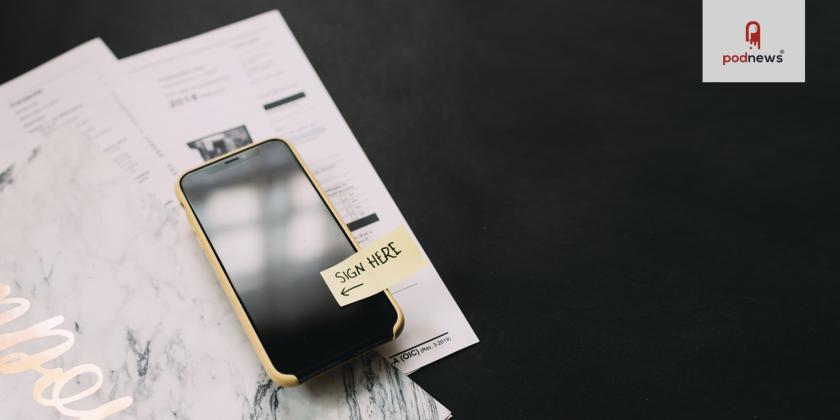
The unwritten contract between podcast publishers and apps

This is an opinion piece.
Podcasting works on an RSS feed: a format that was initially developed and released by Netscape in 1999, and amended by Dave Winer in 2000 to include ‘enclosures’, the audio files that make up a podcast.
A podcast RSS feed consists of, at its most basic, the title and description of a podcast and its episodes, and an address showing a computer to where to find the audio file.
A “podcast app” is better thought of as a search engine for podcasts. Like Google does for websites, it indexes your podcast and links to the audio, making it available for people to discover alongside 2.5m others. Like Google, it doesn’t alter it or charge for your podcast. And, like Google, you don’t normally sign a contract to be available in it.
For traditional media, it’s a very different syndication model to that which they’re used to and their legal people find the differences hard to comprehend: but there is also a certain element of trust implicit in the open podcast ecosystem which some lawyers find hard to cede.
However, in the years since the first podcast in 2003, an understanding has grown between podcast publishers and podcast apps: something you could almost call an unwritten contract. Here it is.
Open RSS feeds are intended for consumption in podcast apps. Just like how Google will index your website and make it discoverable by others, so podcast apps will use your RSS feeds to link to your content. A contract is not required between a podcast publisher and a podcast app to be listed: the publication of an open RSS feed is implicit approval.
- Private RSS feeds do exist, and podcast apps make strenuous efforts to ensure that these are not publicly indexed. Here’s a sample blocklist which many podcast apps use. If you don’t intend your RSS feed to be public, ensure it’s clear that it shouldn’t be ingested by podcast apps.
Podcast apps will not touch or alter the audio in any way. Audio remains on the podcast publisher’s hosting company, and any podcast app out there just links to it. This is important because it means you get the important analytics, like total downloads, from your podcast host. You don’t need to log into a myriad of different publishers to get analytics. (Some do offer additional analytics, but that’s fine).
Your audio won’t be edited. Ads won’t be added to your audio, nor will parts of your audio be edited out.
- Luminary was found to be running a proxy server, and retribution from the industry was swift. The company had a very rocky launch, mainly because it lacked the experience in the podcast industry. Some of the most popular shows were pulled, and Luminary’s brand was significantly harmed.
- Stitcher used to cache and re-encode audio so that, the company claimed, audiences on mobile could listen without chewing through their data bandwidth. The industry reacted by pulling their shows. The company stopped interfering with audio as a result.
- Spotify launched by caching audio, but quickly reached agreement with most large podcast hosts to offer “pass-through”. This allows Spotify to offer a reliable service for all podcasts, including those that self-host, but allows larger podcast hosts to offer the benefit of their reliability.
Podcast apps will not charge to listen to your podcast. While all podcast apps need to earn revenue somehow, none put podcast listening behind a paywall (without, of course, those podcasts being specifically comfortable with that idea). Nobody should get rich out of your podcast, except you.
- Some podcast apps offer paid exclusives, including Apple, Spotify and Amazon. They also offer the catalogue of 2.5m freely-available podcasts; and none make you pay for those free shows.
- Some podcast apps include display advertising, which may allow advertisers to target listeners based on the categories they listen to; or paid memberships for a “plus” service, allowing you to remove ads or unlock more features. This isn’t monetising a specific show.
Podcast apps will not touch or alter the accompanying metadata: the title, description or image. That data is taken directly from the RSS feed, and podcast apps don’t not alter or truncate this.
- There’s a default, defacto standard about what is supported in podcast descriptions and episode notes. There’s a technical limit for Apple Podcasts of 4,000 characters, and certain HTML tags that are accepted; but within these constraints, all podcast apps display titles, descriptions and images without any alteration.
- In 2026, Podcast Addict added a service that automatically added chapter images to podcasts, without telling creators. It quickly selected pornographic images as those chapter images.
These aren’t signed agreements
There are hundreds of podcast apps out there, and it’s clearly impossible to sign specific agreements with each and every one.
Further: there are 2.5m podcasts out there. It’s unrealistic for a podcast app to sign agreements with each and every one of them. It’s also unnecessary, since the podcast is publicly available.
By publishing an open RSS feed, just like publishing an open website, you are inviting people to link to your content: without any contracts or agreements.
Is this a podcast app that will respect the unwritten contract, above? If it is, you should be in it.
Is this a podcast app that doesn’t respect the unwritten contract? Tell the world about it. Drop me a line at editor@podnews.net. As the above examples show, there’s nothing I like better than exposing bad behaviour.

































































































